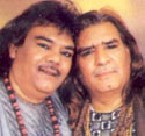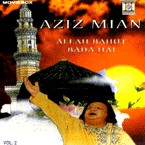Adil Najam
This post was originally posted on October 19, 2006. It is being reposted with the addition of some new Qawali video clips.


As I was driving back from work tonight, I had an old Sabri Brothers cassette playing in my car. The window was down, the sound was loud. As I stopped at a red light, my head still nodding to the rhythms, I noticed that the American woman in the car parked next to me was staring at me with a rather perplexed look (Bostonians don’t often get to hear the Sabri bradraan!). She shouted over the music to ask me what type of music this was and from where. I smiled and told her. I am not sure if she heard what I said over the noise because the light turned green just then and we went our different ways.
I guess she left wondering what the beat and sound was about. I left wondering what has happening to qawalli in Pakistan today? Who are the big names out there? Are there any? Is there any Ghulam Farid Sabri, Aziz Mian, Nusrat Fateh Ali equivalent out there? I know of Rahat Fateh Ali Khan, but he seems to be mostly re-rendering Nusrat Fateh Ali Khan’s work. Who else?
I was a qawalli fan while I was still in school; long before there was a Nusrat Fateh Ali Khan and long before it was kool to be a qawalli fan. I don’t know why I was a fan; no one else around me was. I guess the beat was enticing, the stories interesting, and the qawals colorful. I suspect that those around me thought it was rather odd that I liked qawalli so much; but then, people around me have always considered me odd!
This was the era when the Sabri Brothers Qawall and Aziz Mian Qawall were at the peak of their prowess. They were both major innovators of the qawalli genre. Many purists consider them blasphemous not just because they moved qawalli from being predominantly religious – devotional to everyday-mundane. Remember, the ‘Paani ki qawalli’ and ‘Paisay ki qawalli’ (both by the Sabris) and the populist poetry extravaganzas of Aziz Mian (which often were more Munni Begum than Aziz Mian).
I guess I like qawalli for the same reason I like Johnny Cash and Waris Shah. They all have great stories to tell. And what could be more enticing than a good beat combined with a good story!
I found this video clip of this Sabri Brothers Qawall rendition of an old devotional qawalli. It is not the best recording but it is one of their most popular religious qawallis. And this being Ramzan – yes, I am sticking to Ramzan with a ‘Z’ – it is timely because it used to be a staple of the Sehri transmissions on PTV. Enjoy!
And while we are at it here is a clip of a classical Aziz Mian performance:




















































when ever we go to on long trip by car and start our journey early in the morning i always open my CD”S bag with ”qawwali’s Cd first, specially sabri brothers.and in the morning time it leaves great effects on you.I heard so many times the same qawwali and always love it”sachha yeh waqiya hai azan e Bilal ka ,ek din huzor pak say logon yeh kaha,ya Mustafa azan ghalat daitay hain Bilal,farmaya Mustafa nay yeh such hai tu daikhyee.waqat e sahar ki aaj azan aur koi day.Hazrat Bilal nay jo azan e sahar na di ;kudrat khuda ki daikho na mutlaq sahar howi…….
Recently I happened to attend a qawali here in New York at a fundraiser. Sabri Jr. was the main singer, who is not quite like his father but pretty good. The guests were mostly of Pakistani origin and were enjoying the evening. The American waiters, however, looked indifferent and continued serving the guests and then cleaning the tables in a business like manner. After midnight, when Sabri was beginning to warm up (they usually do around or after midnight), one could see the tired and bored looks on the waiters’ faces. And then Sabri struck the number “laal meri pat rakheeyo …”. The drum beat, the rythm and the pace of music increased. Suddenly there was electricity in the air and one could see the waiters’ faces lighting up. When Sabri reached the line “peera teri naubat baajay …” and went silent as he does at this point in the qawali, and the drummer filled the silence with an incessant and mesmerizing drum beat, the black woman waitress at our table filling a glass of water stopped in the middle, turned her head to the stage and shouted “hellelujah!”. It seemed as if she had felt not only the beat but also the sprituality of the music.
My name is Carri. I’m a screenwriter in Los Angeles, California doing research for a TV program on the sleeping habits of children all over the world, ages 6 to 12. I’d like to include children from Pakistan. I’m wondering if you could help me. I’m specifically looking for information on where children sleep (In the same bedroom with other siblings? On the street? What do their rooms look like? What are their bedtime rituals? I’d like to send parents (or anyone who works with these children) a questionnaire that better explains what I’m doing. My story is meant to be sweet piece on children, for children, but one that also enlightens them to the lives of other children around the world.
Please email me at ckaruhn@msn.com.
Thank you
I heard Aziz Mian Live at the ripe old age of 8, in an army mess in Kharian. I must say he left quite an impression on an 8 year old mind. I personally find “hai kambhakht tu ney pee he nahin” his best. For the longest time I thought the “lal pari” in the qawali referred to Rooh Afzaa.
Does anyone know of the original “khawaja ki diwani” sung by the Sabris? It used to be sold in an EMI cassette with a blue cover. I have not been able to find that version anywhere. It is a mindblowing version.
You bring back great memories. But also a great selection. These two pieces are the most typical of Sabris and Aziz Mian. I wish these clips were longer. Love it when Aziz Mian gets up at the end of the clip in his joosh…